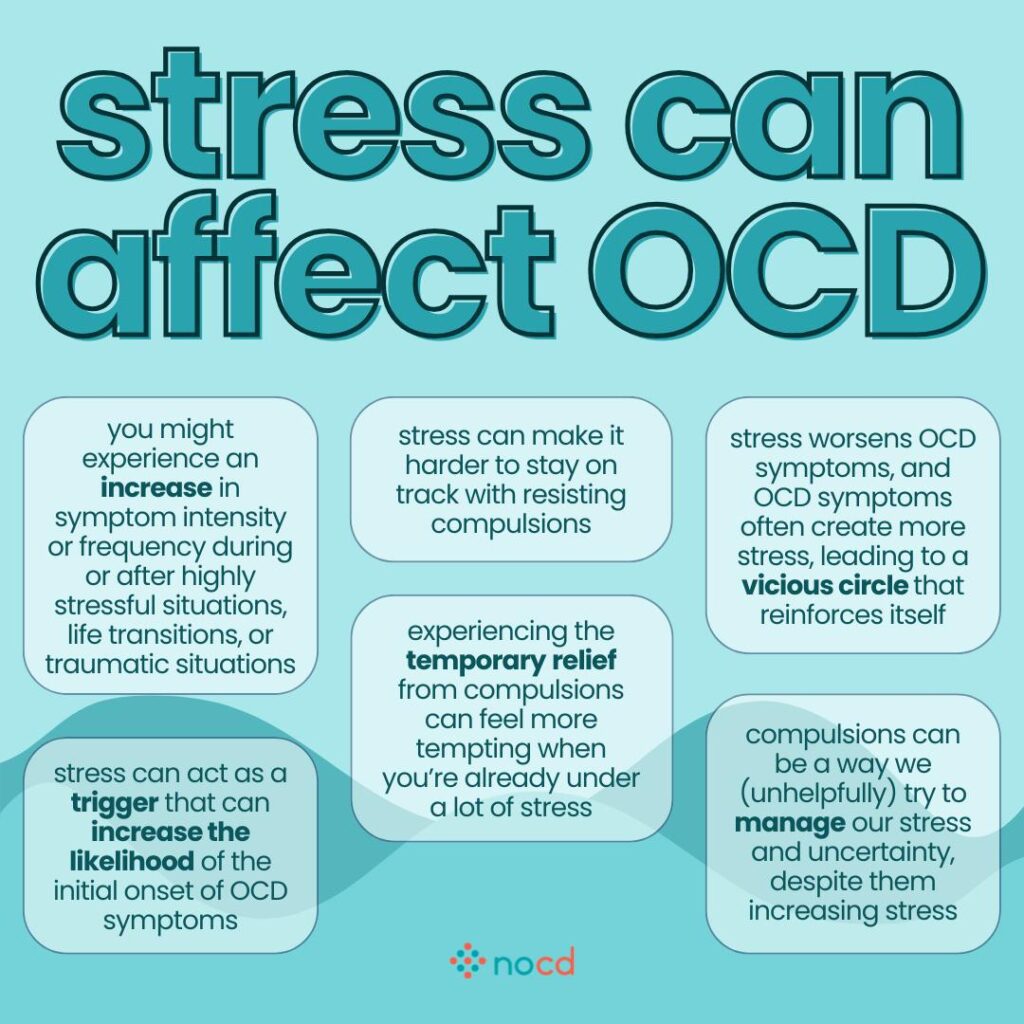Stress doesn’t cause obsessive-compulsive disorder (OCD), but it can make symptoms worse or trigger flare-ups. In fact, research shows that about 60% of people with OCD experienced a stressful life event—such as bereavement, relocation, or pregnancy—within one year before their symptoms began. People with OCD also report that stress often intensifies intrusive thoughts and compulsions, making the condition harder to manage day to day.
Understanding how stress and OCD interact is important for anyone living with the condition. By recognizing the role stress plays in symptom severity, you can take proactive steps to manage both stress levels and OCD more effectively.
How does stress affect OCD symptoms?
“Anytime there is an escalation of stress, it can drive up OCD symptoms in terms of intensity, making them louder and more frequent,” says Tracie Ibrahim, LMFT, CST, NOCD’s Chief Compliance Officer.
Stress increases cortisol and adrenaline levels in the body, which can heighten anxiety and make intrusive thoughts feel more distressing. For people with OCD, this often leads to:
- More frequent intrusive thoughts
- Stronger urges to perform compulsions
Can stress trigger OCD episodes or relapses?
Yes. Stressful events can act as triggers for OCD episodes or symptom relapses, even if someone is already in treatment. For example, moving, starting a new job, or going through a breakup can temporarily worsen OCD symptoms.
While stress doesn’t cause OCD, it can make the condition harder to manage without proper support.
What kinds of stress are most linked to OCD flare-ups?
OCD flare-ups are most often linked to:
- Major life transitions (school, job, marriage, parenthood)
- Interpersonal conflict (arguments, breakups, family strain)
- Chronic stressors (financial pressure, long-term caregiving)
- Traumatic events (accidents, health scares, loss of a loved one)
These events may not directly cause new obsessions, but can lower resilience, making intrusive thoughts feel even more overwhelming.
Is there a link between stress and developing OCD?
Stress alone doesn’t cause OCD. OCD is a neurobiological condition influenced by genetic, neurological, and environmental factors. However, stress can be a risk factor for earlier onset in people who are already predisposed.
How to treat stress and OCD
If you’re dealing with significant stress on top of OCD, know that you’re not alone and that help is available. The most effective treatment for OCD is exposure and response prevention (ERP) therapy. ERP is a specialized form of CBT proven to be effective for OCD. General CBT, if not tailored for OCD, can sometimes be unhelpful or even worsen symptoms.
Studies show that ERP therapy is highly effective, with 80% of people with OCD experiencing a significant reduction in their symptoms.
Other approaches that may help include:
- Medication (typically SSRIs)
- Mindfulness-based strategies
- Acceptance and commitment therapy (ACT)
These are typically done in combination with ERP therapy, depending on the individual’s needs.
Severe or treatment-resistant OCD may benefit from the following therapies:
- Intensive outpatient programs (IOPs)
- Partial hospital programs (PHPs)
- Residential treatment centers (RTCs)
- Transcranial magnetic stimulation (TMS)
- Deep brain stimulation (DBS)
- Gamma knife radiosurgery (GKRS)
In addition to evidence-based treatments, your OCD specialist may implement or recommend the following stress-reduction strategies:
- Healthy coping tools: Sleep, exercise, and mindfulness can reduce overall stress levels.
- Support systems: Talking with family, friends, or support groups can provide grounding during difficult times.
Find the right OCD therapist for you
All our therapists are licensed and trained in exposure and response prevention therapy (ERP), the gold standard treatment for OCD.
Bottom line
While you can’t develop OCD just from stress, it can unmask or intensify symptoms in people who are more susceptible to the condition. If you’re noticing obsessive thoughts or compulsive behaviors that don’t go away when the stress does, it’s a good idea to speak with a mental health professional. With the right treatment, OCD is manageable—even during the most stressful times.
Key takeaways
- Stress does not cause OCD, but it can make symptoms worse.
- Life transitions, trauma, and chronic stress are common triggers for OCD flare-ups.
- Stress can increase the frequency and intensity of intrusive thoughts and compulsions.
- Evidence-based treatments combined with stress-management techniques can help people stay in recovery during stressful times.


